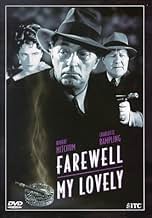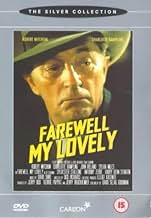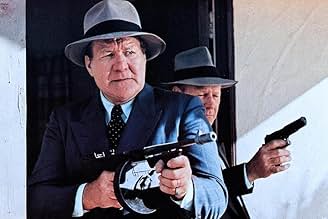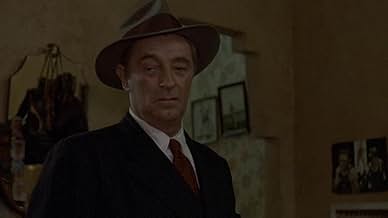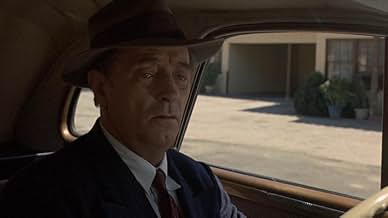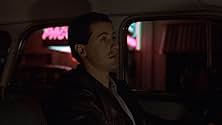VALUTAZIONE IMDb
7,0/10
10.438
LA TUA VALUTAZIONE
L'investigatore privato di Los Angeles Philip Marlowe viene assunto dal detenuto in libertà vigilata Moose Malloy per trovare la sua ragazza Velma, ex ballerina di uno squallido locale nottu... Leggi tuttoL'investigatore privato di Los Angeles Philip Marlowe viene assunto dal detenuto in libertà vigilata Moose Malloy per trovare la sua ragazza Velma, ex ballerina di uno squallido locale notturno.L'investigatore privato di Los Angeles Philip Marlowe viene assunto dal detenuto in libertà vigilata Moose Malloy per trovare la sua ragazza Velma, ex ballerina di uno squallido locale notturno.
- Regia
- Sceneggiatura
- Star
- Candidato a 1 Oscar
- 1 vittoria e 3 candidature totali
Jimmy Archer
- Georgie
- (as Jimmie Archer)
Recensioni in evidenza
The work of Raymond Chandler experienced a resurgence in the 1970s, thanks to Robert Altman's 'The Long Goodbye (1973)' and Roman Polanski's very Chandler-ish 'Chinatown (1974).' The waning career of Robert Mitchum was also revived by two Chandler adaptations, 'Farewell, My Lovely (1975)' {previously filmed by Edward Dmytryk as 'Murder, My Sweet (1944)'} and 'The Big Sleep (1978) {previously filmed by Howard Hawks}. Though outside the traditionally-accepted film noir period (approx. 1940-1958), the 1970s provided an ideal climate for a resurgence of the style. The demise of the Production Code in the 1960s had allowed filmmakers the freedom to explore more explicit themes, usually implying an increase in language, violence and nudity. Chandler's novels – which typically dabbled in themes of prostitution, homosexuality and pornography – could now be adapted faithfully without the threat of censorship, though fortunately, in the case of this particular film, director Dick Richards doesn't overdo the sleaze. The source material is one of the few Marlowe novels I haven't read, but 'Farewell, My Lovely' nevertheless seems a loyal interpretation of the author's style.
Philip Marlowe is the sort of role that Robert Mitchum would have nailed in the 1950s, when he always seemed to feel old and weary without actually looking it. Nevertheless – though he lacks the cocky vigour of Dick Powell, or the invincibility of Humphrey Bogart – the aging Mitchum does communicate what is perhaps Marlowe's most defining characteristic: that of a disillusioned, world-weary private dick looking for something in this world, anything, worth fighting for. In his latest case, Marlowe is hired by fearless lug Moose Malloy (Jack O'Halloran) to find his girlfriend Velma, who vanished while Malloy was serving a prison sentence. As always, what had initially seemed a straightforward assignment soon gets Marlowe embroiled in a complex patchwork of deceits, murders and double-crossings. Crucial to the mystery is Charlotte Rampling (emulating Lauren Bacall) as the adulterous wife of an old millionaire, and Oscar-nominated Sylvia Myles as an alcoholic performance artist. Also look out for small roles from Harry Dean Stanton as Det. Rolfe, and Sylvester Stallone as a lustful thug.
'Farewell, My Lovely' does a fine job of translating Chandler's pessimistic vision of urban decay and human depravity. The 1940s adaptations are, of course, superbly entertaining, but most of them – particularly 'The Big Sleep (1946)' and 'Lady in the Lake (1947)' – are clearly filmed on a pristine studio set, somewhat offsetting the grittiness of Chandler's characters and plot. Richards' film, to his credit, is incredibly ugly. Aside from Helen Grayle, whose sprawling mansion suffers next to Buckingham Palace, most of Marlowe's witnesses live in appalling squalor; even his own office is drab and bathed in shadow. Yet, despite the unpolished milieu, 'Farewell, My Lovely' most assuredly has a heart. Marlowe's wordless interactions with the son of a penniless musician help us see beneath the detective's front of indifference, hinting at his admiration for the honest working-class, and his fervent distaste towards the decadence of the wealthy. When offered his own wealth, Marlowe unthinkingly surrenders it to someone he deems more worthy, a touching but cheerless ending to a film steeped in the unpleasantness of human existence.
Philip Marlowe is the sort of role that Robert Mitchum would have nailed in the 1950s, when he always seemed to feel old and weary without actually looking it. Nevertheless – though he lacks the cocky vigour of Dick Powell, or the invincibility of Humphrey Bogart – the aging Mitchum does communicate what is perhaps Marlowe's most defining characteristic: that of a disillusioned, world-weary private dick looking for something in this world, anything, worth fighting for. In his latest case, Marlowe is hired by fearless lug Moose Malloy (Jack O'Halloran) to find his girlfriend Velma, who vanished while Malloy was serving a prison sentence. As always, what had initially seemed a straightforward assignment soon gets Marlowe embroiled in a complex patchwork of deceits, murders and double-crossings. Crucial to the mystery is Charlotte Rampling (emulating Lauren Bacall) as the adulterous wife of an old millionaire, and Oscar-nominated Sylvia Myles as an alcoholic performance artist. Also look out for small roles from Harry Dean Stanton as Det. Rolfe, and Sylvester Stallone as a lustful thug.
'Farewell, My Lovely' does a fine job of translating Chandler's pessimistic vision of urban decay and human depravity. The 1940s adaptations are, of course, superbly entertaining, but most of them – particularly 'The Big Sleep (1946)' and 'Lady in the Lake (1947)' – are clearly filmed on a pristine studio set, somewhat offsetting the grittiness of Chandler's characters and plot. Richards' film, to his credit, is incredibly ugly. Aside from Helen Grayle, whose sprawling mansion suffers next to Buckingham Palace, most of Marlowe's witnesses live in appalling squalor; even his own office is drab and bathed in shadow. Yet, despite the unpolished milieu, 'Farewell, My Lovely' most assuredly has a heart. Marlowe's wordless interactions with the son of a penniless musician help us see beneath the detective's front of indifference, hinting at his admiration for the honest working-class, and his fervent distaste towards the decadence of the wealthy. When offered his own wealth, Marlowe unthinkingly surrenders it to someone he deems more worthy, a touching but cheerless ending to a film steeped in the unpleasantness of human existence.
Stylish remake of the much-filmed Chandler classic. Was Mitchum too old for the rolethat was the rap at the time. In hindsight, I don't think so, especially when he has that persuasive moment about aging near film's end. He certainly looks like he's climbed too many stairs and closed too many bars, but then that creates an unusual amount of pathos that deepens the role. Still and all, the passionate clinches with a sleek young Charlotte Rampling are borderline at best.
This is one of the few successful neo-noirs in my little book. Director Dick Richards and crew manage a funky look just right for the hard-boiled atmosphere of 40's detective fiction. Marlowe (Mitchum) drifts from one seedy venue to the next in his search for the mysterious Velma. But true to Chandler's slice-of-life LA, there's also a glimpse of the high- and-mighty in a Beverly Hills palace worthy of royalty. In fact, Marlowe resembles something of a pilgrim loner navigating greater LA in search of an elusive truth even after he's forgotten why.
Mitchum, of course, lowkeys all the way, hardly changing expression whether being roughed up by Moose Malloy or nuzzling up to Helen Grayle (Rampling). It has to be one of the more downbeat performances in private eye annals. But my Oscar goes to Sylvia Miles as the ultimate blowzy drunk (Florian). Her house is a mess, her hair is a mess, and her robe never quite fits in revealing ways Marlowe refuses to pick up on. Still and all, a fling with her looks more promising than an interlude with that plastic mannequin Marlowe does cozy up with. At the same time, Jack O'Halloran as the Moose comes across as the kind of pitiable dumb ox who would sacrifice everything for a faithless woman. In fact, the movie boils down oddly to something of a Samson and Delilah update.
But not everything is upside. The dialogue occasionally gets a little too cute, while the DiMaggio running thread seems forced at times. Nonetheless, it's a worthy version of the popular novel, and I'm just sorry that director Dick Richards hasn't been more active in the production end of the business. Judging from this film and the under-rated Culpepper Cattle Company, he certainly has the talent. And when an expressionless Marlowe comes to part with his money at movie's end, we finally glimpse that remote inner terrain and the heart of Chandler's heartless world.
This is one of the few successful neo-noirs in my little book. Director Dick Richards and crew manage a funky look just right for the hard-boiled atmosphere of 40's detective fiction. Marlowe (Mitchum) drifts from one seedy venue to the next in his search for the mysterious Velma. But true to Chandler's slice-of-life LA, there's also a glimpse of the high- and-mighty in a Beverly Hills palace worthy of royalty. In fact, Marlowe resembles something of a pilgrim loner navigating greater LA in search of an elusive truth even after he's forgotten why.
Mitchum, of course, lowkeys all the way, hardly changing expression whether being roughed up by Moose Malloy or nuzzling up to Helen Grayle (Rampling). It has to be one of the more downbeat performances in private eye annals. But my Oscar goes to Sylvia Miles as the ultimate blowzy drunk (Florian). Her house is a mess, her hair is a mess, and her robe never quite fits in revealing ways Marlowe refuses to pick up on. Still and all, a fling with her looks more promising than an interlude with that plastic mannequin Marlowe does cozy up with. At the same time, Jack O'Halloran as the Moose comes across as the kind of pitiable dumb ox who would sacrifice everything for a faithless woman. In fact, the movie boils down oddly to something of a Samson and Delilah update.
But not everything is upside. The dialogue occasionally gets a little too cute, while the DiMaggio running thread seems forced at times. Nonetheless, it's a worthy version of the popular novel, and I'm just sorry that director Dick Richards hasn't been more active in the production end of the business. Judging from this film and the under-rated Culpepper Cattle Company, he certainly has the talent. And when an expressionless Marlowe comes to part with his money at movie's end, we finally glimpse that remote inner terrain and the heart of Chandler's heartless world.
Farewell, My Lovely (1975)
A Truly Gorgeous, Vivid, Stylish Color Noir...Don't Prejudge it on 1940s Noir Terms!
This is a gorgeous surprise, a retreat forward, a 1940s drama not done in painful nostalgic pastel hues and soft edges, but in bold bright 1975 color and pitch dark shadow. You have to say the obvious and get it over with: yes, this is a modern "film noir." But it isn't a mere homage, nor a remake, nor a cheap imitation. Director Dick Richards, who has no other well known film to his credit, pulls a gem out of nowhere on this one. Just be sure to watch it for what it is, a dramatic period crime film, not for what you think it ought to be, a slavish remake of a classic noir. And he has the help of the perfect cinematographer for the subject, John A. Alonzo, who did both Chinatown (the year before) and eight years later, Scarface, both post-noir landmark crime films.
Of course, this version of Farewell, My Lovely is, strictly speaking, a remake, which is to say, it's the third movie based on Raymond Chandler's 1940 novel of the same name. And inevitably we are going to compare to the other great version, Dmytryk's 1944 true, early film noir (called Murder, My Sweet). I say other great version, because both are really fine films, and different enough to avoid copycatting. Farewell, My Lovely is actually the more original of the two, an irony after 31 years of influences. And in some ways it's better, mainly because it has Robert Mitchum very much in top form. He makes those beautifully concise and witty one liners seem real and fitting, as if people really did once talk like that. I wish they still did.
There are countless bit parts that pump up the stylishness of the movie, most memorably Sylvia Miles playing a hard-drinking has-been. And she and Mitchum have great chemistry, not as lovers, but as people from opposite sides of life who have a similar perspective on things, and they chat and resonate like old friends. (Compare this to the rougher, less involving scene in Murder, My Sweet.) Velma herself is none other than Charlotte Rampling, probably a hair miscast because Rampling has some kind of severity that the noirish femme fatales don't, as a stereotype, share. And this movie deals with stereotypes.
Mitchum above all. It's fascinating to see a movie that is meant to be fitting into a form well known enough to be able to both refer to (in style and plot) and to deviate from (so we can feel it's original intent). And to have Mitchum, with his decades of great, strong, roles, anchor it all makes for a sweet, almost poignant experience. A similar feeling might be had in the remake of Cape Fear, but for my money, this is the more interesting movie, whatever the limitations of the plot, and the big thug. Go ahead, compare the Dmytryk version to this Richards one. If you haven't seen either one, watch the more recent one first to give it a full chance. You might go away surprised.
A Truly Gorgeous, Vivid, Stylish Color Noir...Don't Prejudge it on 1940s Noir Terms!
This is a gorgeous surprise, a retreat forward, a 1940s drama not done in painful nostalgic pastel hues and soft edges, but in bold bright 1975 color and pitch dark shadow. You have to say the obvious and get it over with: yes, this is a modern "film noir." But it isn't a mere homage, nor a remake, nor a cheap imitation. Director Dick Richards, who has no other well known film to his credit, pulls a gem out of nowhere on this one. Just be sure to watch it for what it is, a dramatic period crime film, not for what you think it ought to be, a slavish remake of a classic noir. And he has the help of the perfect cinematographer for the subject, John A. Alonzo, who did both Chinatown (the year before) and eight years later, Scarface, both post-noir landmark crime films.
Of course, this version of Farewell, My Lovely is, strictly speaking, a remake, which is to say, it's the third movie based on Raymond Chandler's 1940 novel of the same name. And inevitably we are going to compare to the other great version, Dmytryk's 1944 true, early film noir (called Murder, My Sweet). I say other great version, because both are really fine films, and different enough to avoid copycatting. Farewell, My Lovely is actually the more original of the two, an irony after 31 years of influences. And in some ways it's better, mainly because it has Robert Mitchum very much in top form. He makes those beautifully concise and witty one liners seem real and fitting, as if people really did once talk like that. I wish they still did.
There are countless bit parts that pump up the stylishness of the movie, most memorably Sylvia Miles playing a hard-drinking has-been. And she and Mitchum have great chemistry, not as lovers, but as people from opposite sides of life who have a similar perspective on things, and they chat and resonate like old friends. (Compare this to the rougher, less involving scene in Murder, My Sweet.) Velma herself is none other than Charlotte Rampling, probably a hair miscast because Rampling has some kind of severity that the noirish femme fatales don't, as a stereotype, share. And this movie deals with stereotypes.
Mitchum above all. It's fascinating to see a movie that is meant to be fitting into a form well known enough to be able to both refer to (in style and plot) and to deviate from (so we can feel it's original intent). And to have Mitchum, with his decades of great, strong, roles, anchor it all makes for a sweet, almost poignant experience. A similar feeling might be had in the remake of Cape Fear, but for my money, this is the more interesting movie, whatever the limitations of the plot, and the big thug. Go ahead, compare the Dmytryk version to this Richards one. If you haven't seen either one, watch the more recent one first to give it a full chance. You might go away surprised.
The choice of Mitchum for the lead role really did work. The novel suggest a tired Marlowe, who has had enough of being "detective to the stars". He wants to get out of his seedy little life, and change things, but instead, he gets wrapped up in another case. Mitchum's hang dog expression and tired wise guy act sums up the depression of the fallen hero. This is not the smooth talking Bogart, not the finely clipped and smooth Powell, but a harder, more experienced Marlowe, a man more aware of his own downfall. As he says to knulty, what he need is a nights sleep, what he needs is another drink. After watching this truly excellent recreation of late forties LA, I'm not sure that I couldn't agree with him.
Ah yes, and Charlotte Rampling and the sometime Thelma really was "cuter than lace pants"
Ah yes, and Charlotte Rampling and the sometime Thelma really was "cuter than lace pants"
In the wake of 'The Long Goodbye' and, especially, 'Chinatown', there was a profusion in the mid- to late-70s of recreated films noirs of the Chandlerian bent, many featuring aging stars. 'Farewell My Lovely' is one of the best - while it does not reek of the depravity of Dmytryk's 1944 version, starring Dick Powell, it is broader in scope, and truer to a kind of lived-in realism, as opposed to hard-boiled iconography. It's nice to see 1940s L.A. close to what it might have looked like, and not the vague dreamworlds presented by classic noir. it would be a mistake to assume that this is a progressive, or revisionist movie - while it scores well in its treatment of race, the fundamental misogyny of Chandler's source novel and Dmytryk's film lingers. Indeed, it is less palatable, in that 40s Hollywood made its villainesses glamorous, charismatic and desirable; Charlotte Rampling seems barely to exist on screen, a mere assemblage of corruption and cold amorality.
The hard-boiled detective fictions of Dashiell Hammett and Raymond Chandler were created in conscious opposition to the reactionary puzzles of the English Golden Age (eg Agatha Christie), which were exercises in asserting order and social control. Chandler tried to express a bleaker reality, one where arbitrary violence and corruption is not so easily contained, where smaller crimes may be solved, but society itself is rotten, diseased, irredeemable. Chandler pits his hero Philip Marlowe against this malaise, tough, solitary, misanthropic, frequently compared to medieval knights, as hopelessly out of his time as Don Quixote.
Chandler's novels are completely filtered through the prejudiced narration of Marlowe, so instead of realism we get a barely controlled expressionism, riddled with ideology. Marlowe is unable to trust anyone, and defines himself against everyone else, the Other, especially women and blacks. This is a subtext in the novel, but RIchards foregrounds it in the early scenes of this film. When Marlowe enters a black neighbourhood investigating Velma, he is very uncomfortable in an alien environment. Although, as a detective, he has the freedom to navigate the city, to access both poor black neighbourhoods and obscenely wealthy white mansions in a way neither one of these nor the other can, he is still constrained by ideology, the ideology of his times - he is not as apart from the corruption as he thinks. And so we frequently see him indoors, even imprisoned, by cops and criminals alike - like a conservative, everything is connected for Marlowe, except everything stinks.
This making mental states physical is important for a narrative seen through its hero's head. It puts us on our guard, distances us from Marlowe in a way Chandler never lets us, allows us to be more critical. Another device is the bizarre use of narrative voiceover. This seems conventional enough, Marlowe telling us the story, controlling, interpreting, often verbatim from the book. But his voiceover is broken - he starts addressing us, then, within that, he tells Nulty a story; so that the viewer is at two removes from a story that we only have it's teller's word for its veracity. In its modest way, the film DOES have revisionist aspirations.
Unlike Altman's film, 'Farewell' is purely enjoyable on the level of a murder-mystery thriller - the plot is satisfyingly, Chandlerianly (sic?) opaque; there are sufficient interesting supporting characters; the violence seems quaintly 1940s; the music is exciting. The film, therefore, would be pleasant, but harmless, except for one crucial element: Robert Mitchum, America's greatest actor. His aging Marlowe might be more appropriate to 'The Long Goodbye', but this is an astonishing portrait of middle- giving on to old-age, a study of a man struggling with cynicism, trying to maintain order (wisecracks; narration; frequent references to baseball, a game with rules) and humanity (the kid) in a world that only offers diabolic inversions of each.
Even more resonantly, the film is a film about film noir, about acting, about Robert Mitchum, soon to become famous in the period represented, soon the embodiment of the doomed noir hero. The Chandlerian dialogue that works wonderfully on the page can seem corny and stilted when spoken, but Mitchum pulls it off with melancholy beauty. He is the only screen Marlowe that seems like an actual human being who has lived - not even Bogie quite managed that.
The hard-boiled detective fictions of Dashiell Hammett and Raymond Chandler were created in conscious opposition to the reactionary puzzles of the English Golden Age (eg Agatha Christie), which were exercises in asserting order and social control. Chandler tried to express a bleaker reality, one where arbitrary violence and corruption is not so easily contained, where smaller crimes may be solved, but society itself is rotten, diseased, irredeemable. Chandler pits his hero Philip Marlowe against this malaise, tough, solitary, misanthropic, frequently compared to medieval knights, as hopelessly out of his time as Don Quixote.
Chandler's novels are completely filtered through the prejudiced narration of Marlowe, so instead of realism we get a barely controlled expressionism, riddled with ideology. Marlowe is unable to trust anyone, and defines himself against everyone else, the Other, especially women and blacks. This is a subtext in the novel, but RIchards foregrounds it in the early scenes of this film. When Marlowe enters a black neighbourhood investigating Velma, he is very uncomfortable in an alien environment. Although, as a detective, he has the freedom to navigate the city, to access both poor black neighbourhoods and obscenely wealthy white mansions in a way neither one of these nor the other can, he is still constrained by ideology, the ideology of his times - he is not as apart from the corruption as he thinks. And so we frequently see him indoors, even imprisoned, by cops and criminals alike - like a conservative, everything is connected for Marlowe, except everything stinks.
This making mental states physical is important for a narrative seen through its hero's head. It puts us on our guard, distances us from Marlowe in a way Chandler never lets us, allows us to be more critical. Another device is the bizarre use of narrative voiceover. This seems conventional enough, Marlowe telling us the story, controlling, interpreting, often verbatim from the book. But his voiceover is broken - he starts addressing us, then, within that, he tells Nulty a story; so that the viewer is at two removes from a story that we only have it's teller's word for its veracity. In its modest way, the film DOES have revisionist aspirations.
Unlike Altman's film, 'Farewell' is purely enjoyable on the level of a murder-mystery thriller - the plot is satisfyingly, Chandlerianly (sic?) opaque; there are sufficient interesting supporting characters; the violence seems quaintly 1940s; the music is exciting. The film, therefore, would be pleasant, but harmless, except for one crucial element: Robert Mitchum, America's greatest actor. His aging Marlowe might be more appropriate to 'The Long Goodbye', but this is an astonishing portrait of middle- giving on to old-age, a study of a man struggling with cynicism, trying to maintain order (wisecracks; narration; frequent references to baseball, a game with rules) and humanity (the kid) in a world that only offers diabolic inversions of each.
Even more resonantly, the film is a film about film noir, about acting, about Robert Mitchum, soon to become famous in the period represented, soon the embodiment of the doomed noir hero. The Chandlerian dialogue that works wonderfully on the page can seem corny and stilted when spoken, but Mitchum pulls it off with melancholy beauty. He is the only screen Marlowe that seems like an actual human being who has lived - not even Bogie quite managed that.
Lo sapevi?
- QuizIn the novel, Philip Marlowe was in his 30s. Robert Mitchum, who plays him in this film, was 57.
- BlooperWhen Marlowe (Robert Mitchum) drives up to Mrs. Grayle's home (Charlotte Rampling), the front entrance is obviously double doors but when the butler is shown opening it from the inside, it is clearly a single door.
- Citazioni
Philip Marlowe: [voiceover] The house itself wasn't much. It was smaller than Buckingham Palace and probably had fewer windows than the Chrysler building.
- ConnessioniFeatured in Proini peripolos (1987)
- Colonne sonoreI've Heard That Song Before
Words and Music by Jule Styne and Sammy Cahn
Sung in the dance hall at the opening.
I più visti
Accedi per valutare e creare un elenco di titoli salvati per ottenere consigli personalizzati
- How long is Farewell, My Lovely?Powered by Alexa
Dettagli
Botteghino
- Budget
- 2.500.000 USD (previsto)
Contribuisci a questa pagina
Suggerisci una modifica o aggiungi i contenuti mancanti


